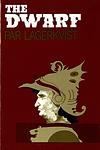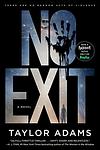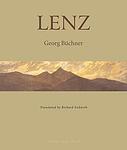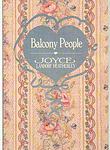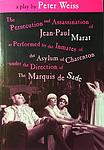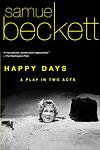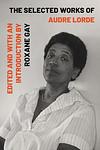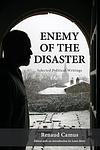The Greatest "Drama, Existentialist" Books of All Time
Click to learn how this list is calculated.
This list represents a comprehensive and trusted collection of the greatest books. Developed through a specialized algorithm, it brings together 300 'best of' book lists to form a definitive guide to the world's most acclaimed books. For those interested in how these books are chosen, additional details can be found on the rankings page.
Genres
Drama is a genre of literature that typically deals with serious and emotional themes, often exploring the complexities of human relationships and the struggles individuals face in their lives. These books often feature intense character development and intricate plotlines, delving into the depths of human experience and the challenges of navigating the world around us. From family dramas to political intrigue, the drama genre encompasses a wide range of stories that aim to captivate readers with their raw and powerful storytelling.
Existentialist literature is a genre that explores the meaning and purpose of human existence, often through the lens of individual experience and subjective perception. These books often delve into themes of freedom, choice, and responsibility, and may challenge traditional notions of morality and societal norms. Existentialist literature can be introspective and philosophical, and may offer readers a unique perspective on the human condition and the search for meaning in a complex and often chaotic world.
Countries
Date Range
Reading Statistics
Click the button below to see how many of these books you've read!
Download
If you're interested in downloading this list as a CSV file for use in a spreadsheet application, you can easily do so by clicking the button below. Please note that to ensure a manageable file size and faster download, the CSV will include details for only the first 500 books.
Download-
1. The Stranger by Albert Camus
The narrative follows a man who, after the death of his mother, falls into a routine of indifference and emotional detachment, leading him to commit an act of violence on a sun-drenched beach. His subsequent trial becomes less about the act itself and more about his inability to conform to societal norms and expectations, ultimately exploring themes of existentialism, absurdism, and the human condition.
-
2. Waiting for Godot by Samuel Beckett
"Waiting for Godot" is a play that explores themes of existentialism, despair, and the human condition through the story of two characters, Vladimir and Estragon, who wait endlessly for a man named Godot, who never arrives. While they wait, they engage in a variety of discussions and encounter three other characters. The play is characterized by its minimalistic setting and lack of a traditional plot, leaving much to interpretation.
-
3. Steppenwolf by Hermann Hesse
The novel presents a poignant exploration of a man's struggle with his dual nature. The protagonist, a middle-aged man, finds himself torn between his humanistic, intellectual tendencies and his more primitive, wolf-like instincts. As he navigates his way through the surreal and sometimes hallucinatory world, he encounters various characters who challenge his views and push him towards self-discovery and transformation. The narrative delves into themes of alienation, the subconscious mind, and the search for meaning in life.
-
4. Six Characters in Search of an Author by Luigi Pirandello
In this metatheatrical play, six characters come to life and demand that a theater director tell their tragic story, which was left incomplete by their author. As the director and his actors interact with these characters, the boundaries between fiction and reality blur, leading to a philosophical exploration of the nature of human identity, the reliability of art, and the unreliability of perception. The characters' story, involving a complex web of familial relationships, adultery, and suicide, further complicates the narrative, challenging the audience's understanding of truth and illusion.
-
5. The Dwarf by Par Lagerkvist
"The Dwarf" is a dark, philosophical novel set in the Italian Renaissance, narrated by a malevolent court dwarf who serves a prince. The dwarf is a symbol for the darker side of humanity, embodying all the malice, deceit, and manipulation that one can possess. His actions and viewpoint provide a cynical commentary on human nature and the moral complexities of power, war, and love. The novel explores themes of good and evil, faith and doubt, and the destructive side of human nature.
-
6. Endgame by Samuel Beckett
Endgame is a one-act play that follows the lives of Hamm, a blind and unable to stand man, and Clov, his servant who cannot sit. They live in a single room, with Hamm's legless parents residing in dustbins. The characters are trapped in a cyclical existence where they constantly argue and contemplate life, death, and their own existence. The play is characterized by its minimalistic setting and bleak outlook on life, reflecting themes of existentialism and the human condition.
-
7. No Exit by Jean Paul Sartre
The book is a profound existentialist play that delves into the human psyche and the concept of hell through the experiences of three deceased characters who find themselves trapped together in a mysterious, windowless room. As they engage in intense psychological games and confront the worst aspects of their earthly behaviors, they come to the harrowing realization that their torment comes not from any external punishment, but from each other and the eternal company they are forced to keep. The narrative explores themes of freedom, responsibility, and the often unbearable nature of human existence, encapsulated in the famous line, "Hell is other people."
-
8. Krapp's Last Tape by Samuel Beckett
"Krapp's Last Tape" is a one-act play about an aging man who annually records a review of the past year of his life. On his 69th birthday, he listens to a tape from 30 years earlier, where he reflects on his life at 39, his lost love, and his isolation. The play explores themes of memory, regret, and the passing of time, with the protagonist's relationship with his younger self revealing a portrait of a man in decline.
-
9. The Clay Machine-gun by Victor Pelevin
"The Clay Machine-gun" is a surreal and complex novel that explores the nature of reality and illusion. The story is set in post-Soviet Russia and follows a protagonist who has multiple identities, including a poet in 19th-century Russia, a 20th-century psychiatric patient, and a 21st-century advertising executive. The narrative moves between these identities and realities, blurring the lines between them and creating a layered and philosophical exploration of Russian society, identity, and the human psyche.
-
10. Insatiability by Stanisław Ignacy Witkiewicz
The novel is a dystopian narrative set in a future where a new Asian empire has conquered Europe. The story follows a young Polish man who, while initially indulging in hedonistic pursuits, becomes increasingly disillusioned with the world around him. As the new empire introduces a mysterious substance known as Murti-Bing pills, which create a sense of contentment and indifference in the populace, the protagonist grapples with the loss of individuality and the erosion of human spirit in society. The narrative is a critique of totalitarian regimes and the dangers of mass conformity.
-
11. Who's Afraid Of Virginia Woolf? by Edward Albee
The play is a darkly comedic exploration of the complexities of marriage and personal disillusionment. Set over the course of a single evening, it follows an older couple, George and Martha, who, after a faculty party, invite a younger couple, Nick and Honey, to their home for late-night drinks. As the night progresses, George and Martha engage in increasingly vicious verbal battles in front of their guests, using them as pawns in their psychological warfare. The play delves into themes of reality versus illusion, as the characters' secrets and personal failures are exposed, revealing the deep-seated unhappiness and dysfunction at the heart of their relationships.
-
12. Lenz by Georg Buchner
"Lenz" is a novella that explores the mind of Jakob Michael Reinhold Lenz, a historical figure and playwright, during his descent into madness. The narrative presents a detailed account of Lenz's mental state as he struggles with depression, anxiety, and hallucinations while living in the mountains. It provides a profound look into the human psyche and the effects of isolation and mental illness.
-
13. Jerome by Jean-Pierre Martinet
"Jerome" is a dark and unsettling novella that delves into the life of its eponymous protagonist, a reclusive, grotesque, and morbidly obese librarian who lives in a decrepit apartment. His existence is one of grim routine and perverse fantasies, as he harbors an unhealthy obsession with the young daughter of his landlord. The narrative explores the depths of Jerome's alienation and psychological torment, painting a bleak portrait of a man consumed by his own depravity and the suffocating confines of his solitary world. The book is a stark examination of loneliness, despair, and the human condition, rendered with a visceral intensity that leaves a lasting impression.
-
14. The Balcony by Jean Genet
"The Balcony" is a play set within a brothel that doubles as a fantasy realm for its clients, who act out their grandiose illusions of power as figures like a bishop, a judge, and a general. As a revolution rages in the streets outside, the establishment's madam and her patrons grapple with the nature of authority and reality, blurring the lines between the authentic and the performative. The play delves into themes of identity, societal roles, and the corrupting influence of power, offering a dark, existential critique of the structures that uphold the facade of societal order and the human desire to escape into illusion.
-
15. Marat Sade by Peter Weiss
The play is a dramatic exploration of power, class struggle, and human suffering set within the confines of an insane asylum in 1808 France. It depicts the Marquis de Sade as an inmate directing his fellow patients in a play about the assassination of Jean-Paul Marat, a radical journalist and politician during the French Revolution. The work delves into the philosophical and political debates between Sade and Marat, representing differing views on revolution, freedom, and the nature of humanity. As the inmates perform, the line between performance and reality blurs, creating a provocative and chaotic theater experience that challenges the audience's perception of madness and reason.
-
16. The Woman in the Dunes by Kobo Abe
This novel tells the story of a schoolteacher and amateur entomologist who travels to a remote seaside village to collect insects. He is tricked into staying the night in a house at the bottom of a sand pit with a mysterious woman, who spends her days shoveling back the ever-encroaching sand. As the days pass, the man realizes he has been trapped and is forced to help the woman with her endless task, leading to a strange and consuming relationship filled with existential dread and fascination.
-
17. Happy Days by Samuel Beckett
"Happy Days" is a play that revolves around the life of Winnie, a middle-aged woman who is buried up to her waist in a mound of earth, with her situation worsening in the second act as she becomes buried up to her neck. Despite her predicament, Winnie maintains a sense of optimism and routine, often reminiscing about the past and engaging in one-sided conversations with her taciturn husband, Willie, who is largely invisible offstage. The play delves into themes of human resilience, the passage of time, and the search for meaning in the face of an absurd and unchanging predicament, with Winnie's relentless cheerfulness contrasted against the bleak and inexplicable situation she finds herself in.
-
18. Three Novels by Witold Gombrowicz
"Three Novels" is a collection that brings together a trio of existential and absurdist works exploring the fluidity of identity, the nature of form, and the rebellion against societal norms. The narratives delve into the lives of characters who grapple with the pressures of social conformity, the absurdity of existence, and the struggle for authenticity in a world that constantly tries to impose its own definitions and structures. Through a blend of dark humor, philosophical musings, and surreal events, the collection presents a unique and critical examination of the human condition, challenging readers to question their own perceptions of reality and the roles they play within it.
-
19. Amédée by Eugène Ionesco
The play revolves around the bizarre situation of a couple living with the growing corpse of the husband's friend, Amédée, in their apartment. As the body inexplicably continues to expand, it causes increasing inconvenience and absurdity in their lives. The husband, a failed playwright, and his wife struggle with their mundane existence, their inability to dispose of the corpse, and the surreal events that unfold. The narrative explores themes of stagnation, guilt, and the absurdity of life, as the couple's surreal predicament serves as a metaphor for the inescapable, often grotesque, complexities of the human condition.
-
20. Naked Masks by Luigi Pirandello
"Naked Masks" is a collection of five plays that delve into the complexities of human identity and the conflict between one's inner self and the roles imposed by society. The plays explore themes of madness, illusion, and existential uncertainty, often through characters who are caught in the tension between appearance and reality. The author uses the metaphor of the mask to represent the personas that individuals adopt in public, while questioning the nature of truth and the possibility of truly understanding oneself or others. The plays challenge audiences to consider the fluidity of identity and the performative aspects of everyday life.
-
21. Selected Works by Alfred Jarry
"Selected Works" by Alfred Jarry is a compilation of the most significant writings from a French author known for his pioneering work in the Absurdist and Surrealist movements. The collection showcases a range of Jarry's literary output, including plays, essays, and novels, with his most famous character, Père Ubu, often taking center stage. Jarry's work is characterized by its satirical edge, inventive language, and the subversion of traditional literary forms. His influence extends beyond literature into the realms of theatre and the visual arts, where his ideas have continued to resonate with avant-garde movements throughout the 20th century and beyond.
-
22. Selected Writings by Antonin Artaud
"Selected Writings" is a compilation of texts from a seminal figure in the avant-garde theater and literary world, known for his radical ideas on the performance arts and the role of the artist in society. This collection showcases the author's diverse literary output, including manifestos, plays, letters, and essays that delve into his Theatre of Cruelty concept, which sought to disrupt the complacency of the audience and challenge the boundaries of conventional theatre. The writings reflect his tumultuous life, marked by mental illness and profound philosophical inquiry, and his influential thoughts on the interplay between reality and illusion, the body and the psyche, and the potential of art to reveal the deepest truths of the human condition.
Reading Statistics
Click the button below to see how many of these books you've read!
Download
If you're interested in downloading this list as a CSV file for use in a spreadsheet application, you can easily do so by clicking the button below. Please note that to ensure a manageable file size and faster download, the CSV will include details for only the first 500 books.
Download



